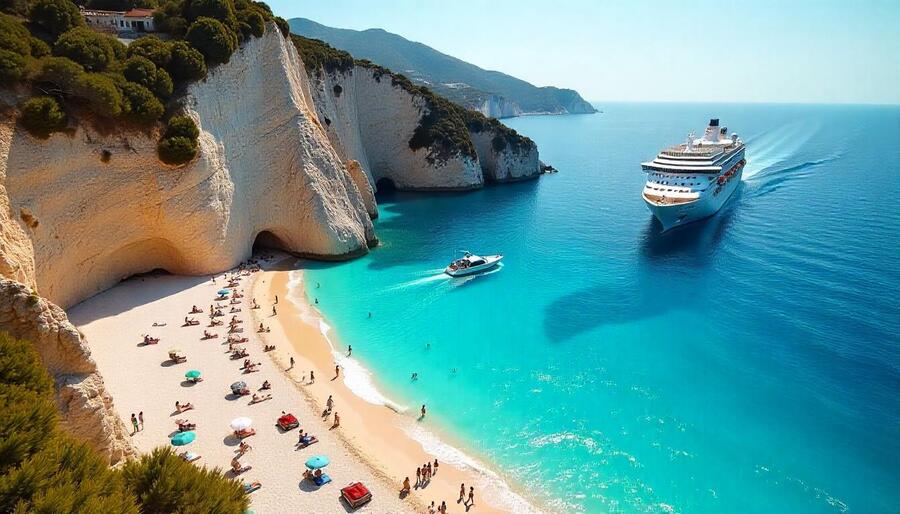≡-Greece Introduces Landmark Cruise Ship Tax Policy to Tackle Overtourism, Generate Revenue, and Improve Visitor Management in the Country’s Most Iconic Island Destinations – Viral of Today
<> Viral of Today <>
Home » CRUISE NEWS » Greece Introduces Landmark Cruise Ship Tax Policy to Tackle Overtourism, Generate Revenue, and Improve Visitor Management in the Country’s Most Iconic Island Destinations Tuesday, July 8, 2025Greece has announced the launch of a new seasonal tourist tax aimed specifically at cruise passengers, marking a significant step in its efforts to manage the rising pressures of overtourism on its islands. Set to begin in July 2025, the tax will apply to cruise ships docking at popular Greek islands, especially those experiencing extreme tourism volumes during the summer months.Under the new policy, each cruise passenger disembarking at highly trafficked destinations—such as well-known islands in the Aegean Sea—will be charged €20 (approximately USD 23.62). For less visited or smaller islands, the fee is reduced to €5 per person. This tax will be enforced annually during the peak summer travel period, spanning from June 1 to September 30.Officials estimate the initiative could generate up to €50 million per year, with the revenue earmarked for critical infrastructure upgrades. These include the modernization of island ports, waste management systems, water conservation projects, and expanded local services—areas that have been under considerable strain due to the continued rise in cruise ship tourism.The move positions Greece alongside a growing number of European destinations taking a firmer stance on visitor management and sustainability. Cities like Venice have introduced entry fees for day visitors, while popular regions in Spain are tightening regulations to limit mass tourism’s impact on local life. These actions reflect a broader shift across Europe, where the tourism industry is being reshaped by concerns over environmental degradation, social equity, and infrastructure sustainability.Cruise tourism has grown rapidly in Greece, with passenger traffic surging by more than 13% last year to reach 7.9 million visitors. Two of the country’s most iconic destinations each recorded over 1.3 million cruise arrivals in 2024, despite earlier efforts to impose caps on daily entries. While the economic benefits are undeniable, this surge has amplified public concern about pollution, water scarcity, mounting waste, and chronic traffic congestion—particularly on smaller islands with limited capacity.Local residents in affected areas have long voiced frustration over the disproportionate burden cruise ships place on their communities. Not only do these vessels strain public services and degrade natural resources, but critics also argue that cruise passengers contribute significantly less to the local economy than traditional overnight visitors. With limited time ashore, cruise travelers often spend minimally on lodging, food, or cultural experiences.Despite these mounting concerns, the new tax has sparked mixed reactions from stakeholders. Some tourism operators and port authorities warn that the policy may create unfair competition between taxed and non-taxed destinations, potentially redirecting cruise traffic away from smaller, taxed ports. Others fear that international cruise companies may respond by reducing the frequency of stops in Greece altogether, especially if operational costs increase.On the other hand, proponents of the policy argue that the tax is a necessary and overdue response to the growing challenges faced by coastal communities. With international arrivals reaching 40.7 million in 2024—a 12.8% increase from the year before—Greece faces a delicate balancing act between sustaining tourism’s economic momentum and protecting its natural and cultural assets.Industry representatives also point out that the cruise sector plays a major role in the national economy, generating an estimated €2 billion annually and supporting thousands of jobs. However, the long-term viability of this growth model is now under review, as more destinations struggle with overcrowding and ecological stress.By implementing this cruise passenger tax, Greece signals a broader shift toward more sustainable tourism practices. The initiative aims to reduce the footprint of short-term visits while generating revenue that will help reinforce local infrastructure. As the global tourism sector evolves, Greece is taking a proactive stance to ensure that its islands remain both economically vibrant and environmentally resilient for generations to come.
This information will surprise you!
See also
- Read until the end to discover everything.
- Important information you need to know.
- Interesting facts and helpful tips.
Conclusion
Did you enjoy the news? Keep following us daily!













